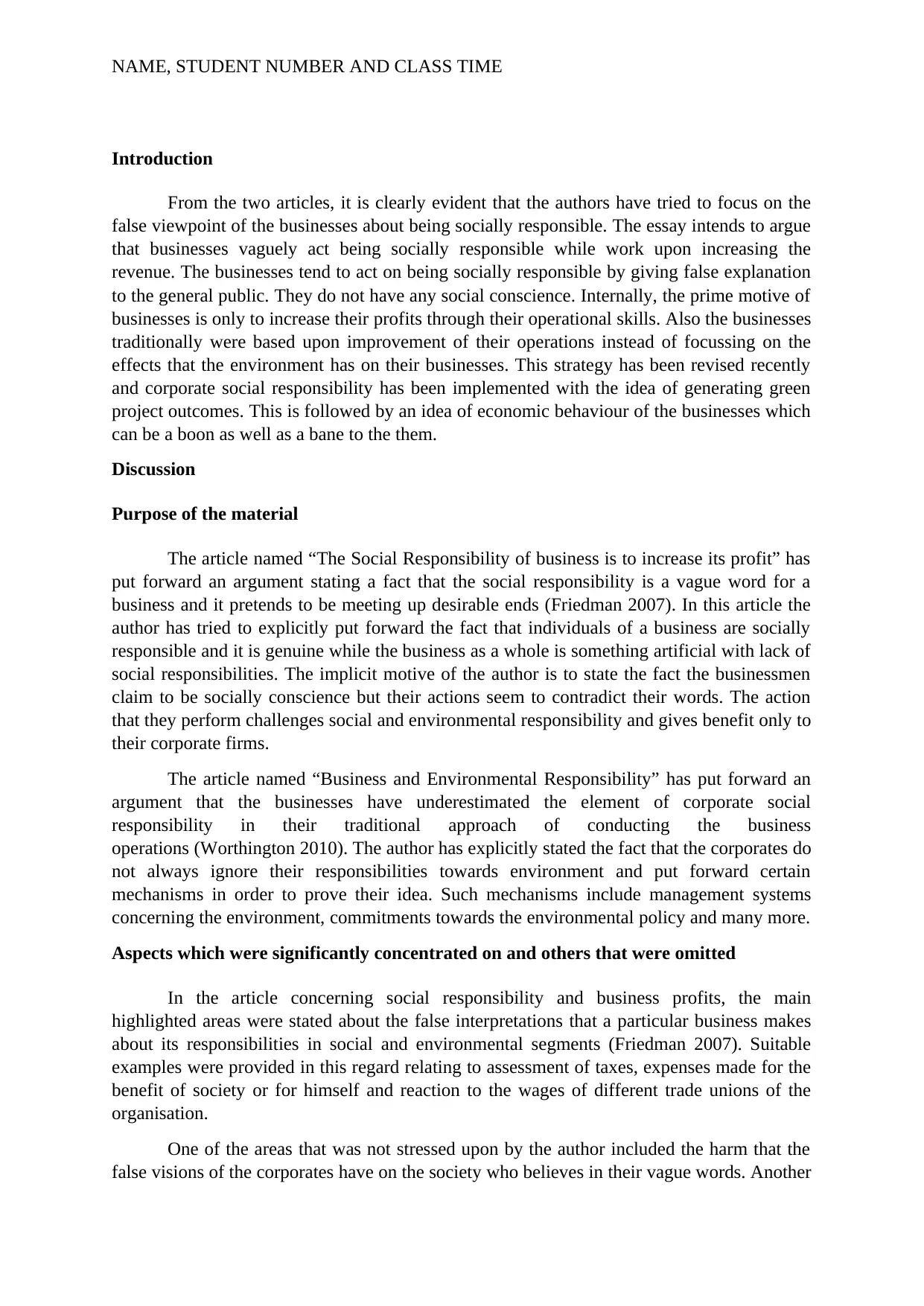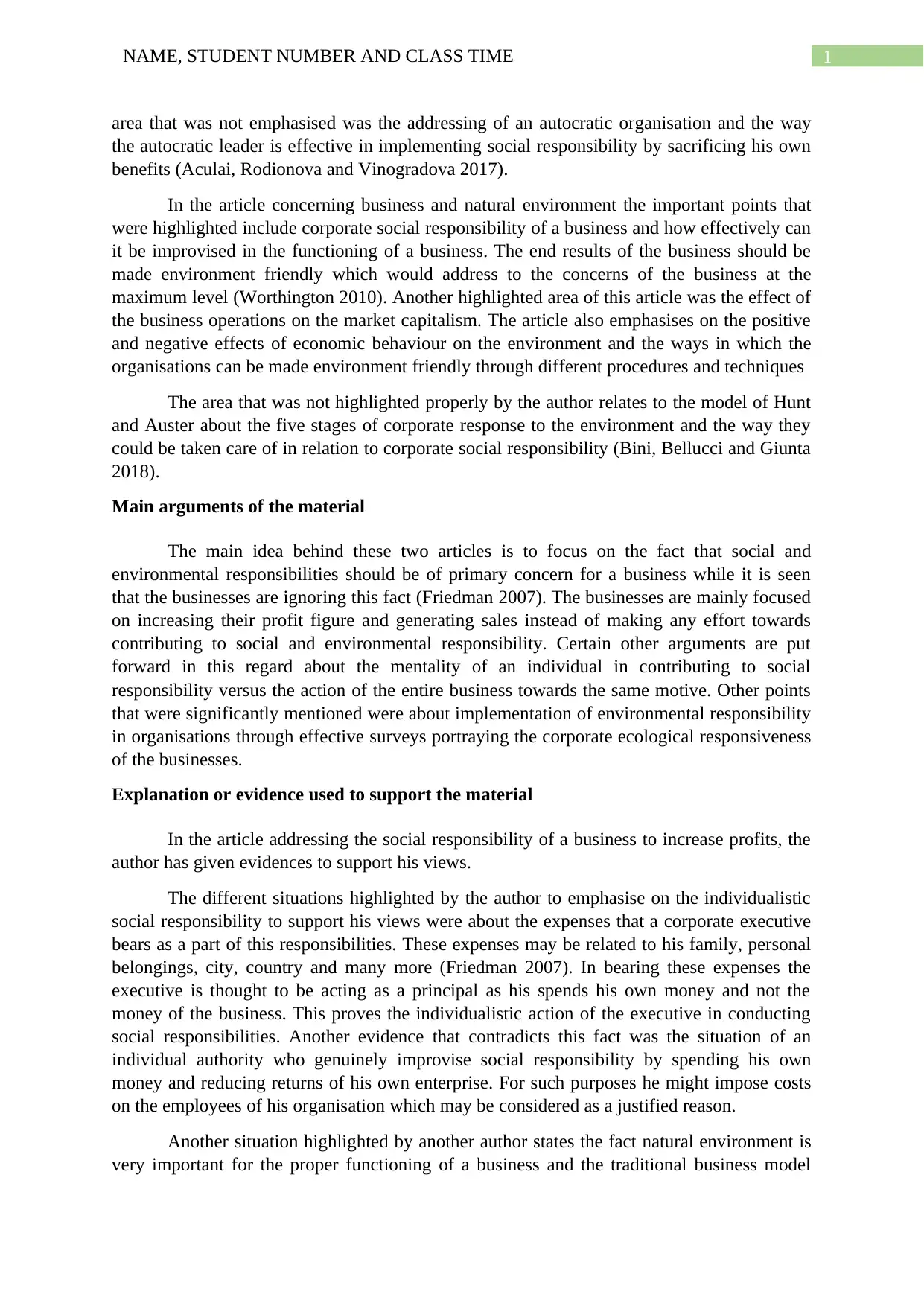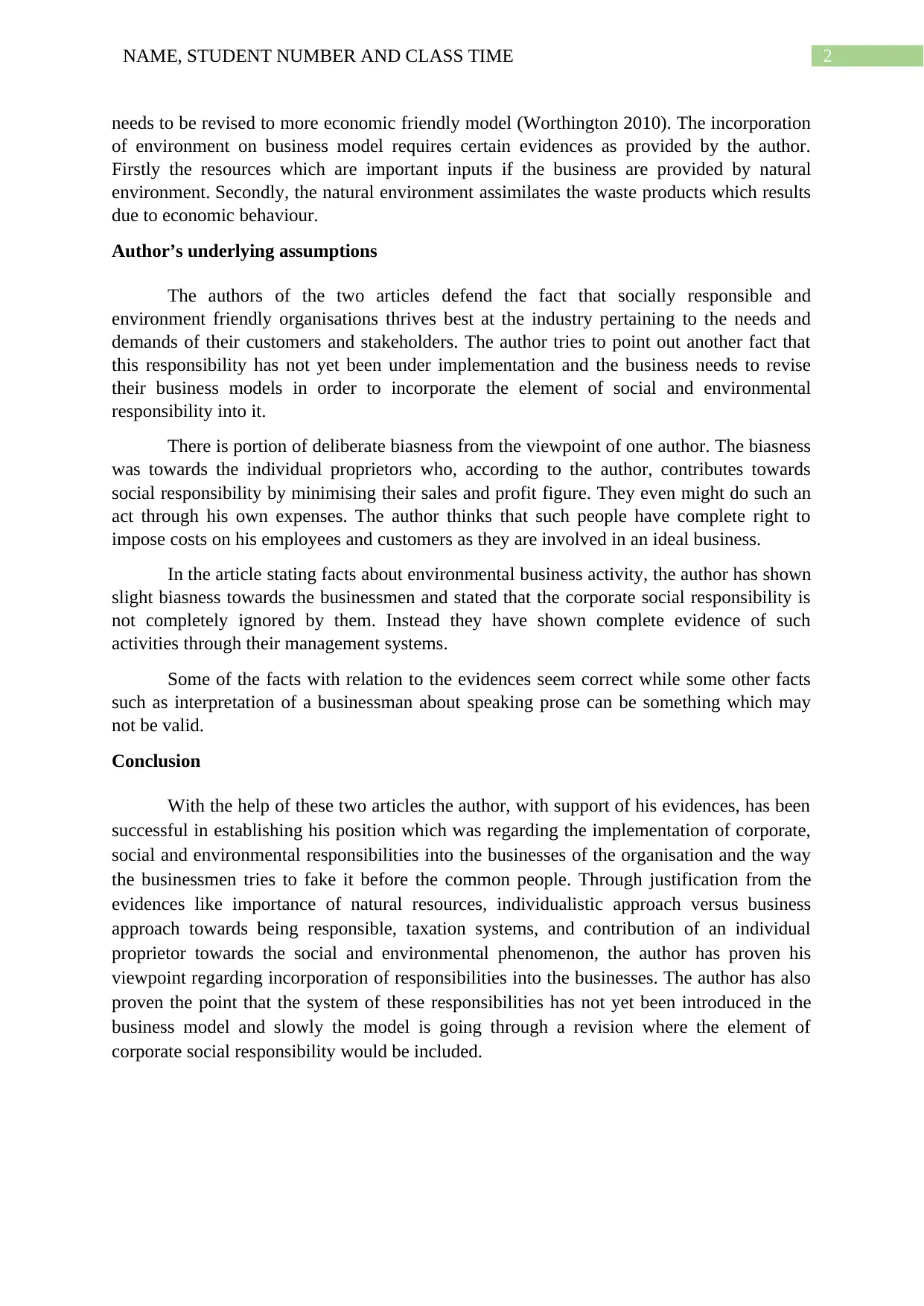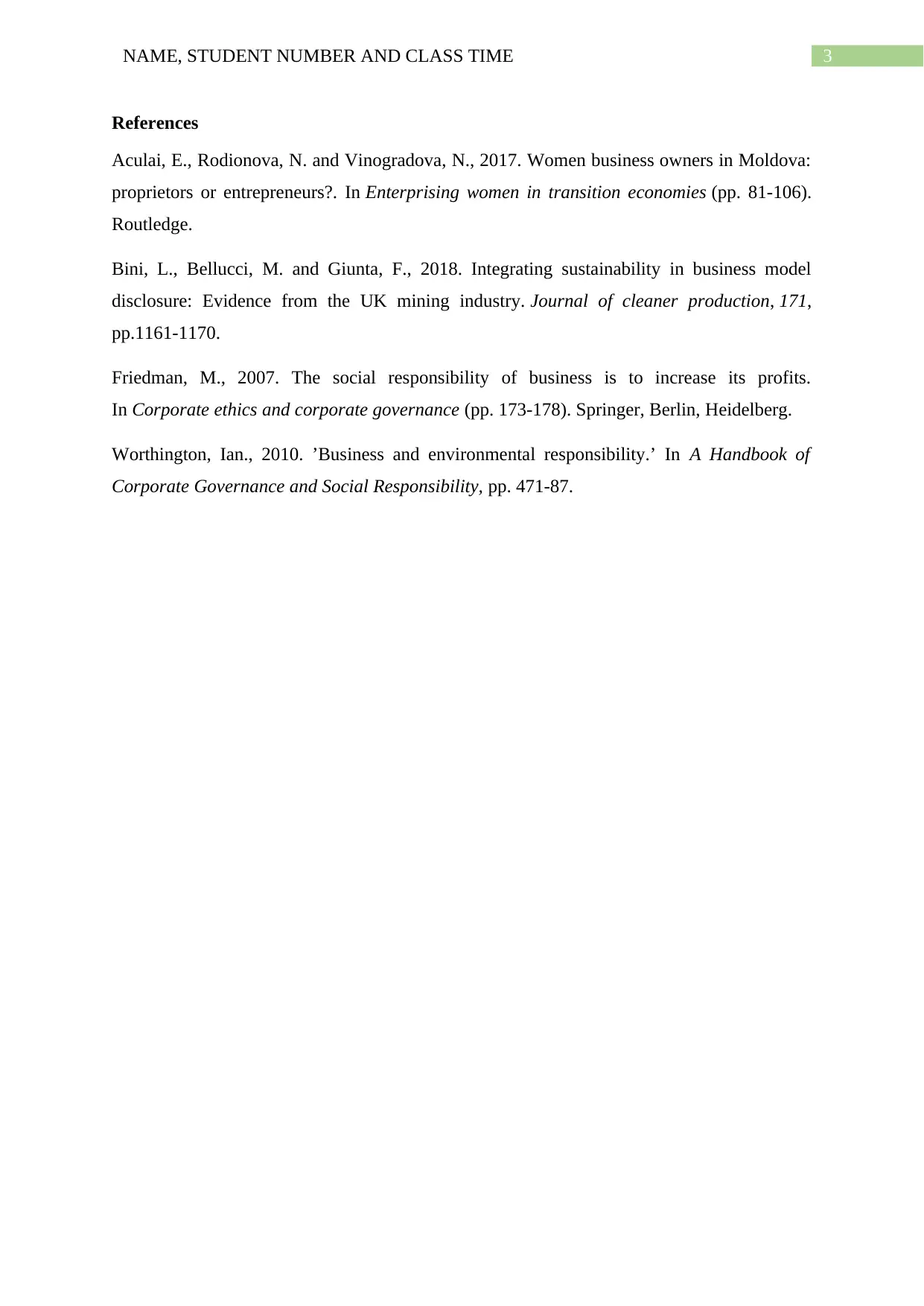Social Responsibility of Business: An Analytical Essay
VerifiedAdded on 2022/11/03
|4
|1661
|153
Essay
AI Summary
This essay critically analyzes the concept of social responsibility within the context of business operations, drawing upon two provided articles. The author argues that businesses often present a facade of social responsibility while primarily focusing on profit maximization. The essay dissects the arguments presented, highlighting the tension between individual and corporate actions, and the evolving understanding of environmental responsibility. It examines the viewpoints of Milton Friedman and others, exploring how businesses may prioritize revenue over genuine social and environmental concerns. The analysis covers key aspects such as the impact of business practices on society, the role of individual ethics within a corporate structure, and the shift towards integrating corporate social responsibility (CSR) into business models. The essay also considers the influence of external factors, such as customer and stakeholder demands, on shaping corporate behavior. The author concludes that while businesses are slowly adapting to incorporate CSR, there remains a gap between stated intentions and actual practices. The essay utilizes evidence from the articles to support its claims, including examples related to taxation, wages, and environmental management.

NAME, STUDENT NUMBER AND CLASS TIME
Introduction
From the two articles, it is clearly evident that the authors have tried to focus on the
false viewpoint of the businesses about being socially responsible. The essay intends to argue
that businesses vaguely act being socially responsible while work upon increasing the
revenue. The businesses tend to act on being socially responsible by giving false explanation
to the general public. They do not have any social conscience. Internally, the prime motive of
businesses is only to increase their profits through their operational skills. Also the businesses
traditionally were based upon improvement of their operations instead of focussing on the
effects that the environment has on their businesses. This strategy has been revised recently
and corporate social responsibility has been implemented with the idea of generating green
project outcomes. This is followed by an idea of economic behaviour of the businesses which
can be a boon as well as a bane to the them.
Discussion
Purpose of the material
The article named “The Social Responsibility of business is to increase its profit” has
put forward an argument stating a fact that the social responsibility is a vague word for a
business and it pretends to be meeting up desirable ends (Friedman 2007). In this article the
author has tried to explicitly put forward the fact that individuals of a business are socially
responsible and it is genuine while the business as a whole is something artificial with lack of
social responsibilities. The implicit motive of the author is to state the fact the businessmen
claim to be socially conscience but their actions seem to contradict their words. The action
that they perform challenges social and environmental responsibility and gives benefit only to
their corporate firms.
The article named “Business and Environmental Responsibility” has put forward an
argument that the businesses have underestimated the element of corporate social
responsibility in their traditional approach of conducting the business
operations (Worthington 2010). The author has explicitly stated the fact that the corporates do
not always ignore their responsibilities towards environment and put forward certain
mechanisms in order to prove their idea. Such mechanisms include management systems
concerning the environment, commitments towards the environmental policy and many more.
Aspects which were significantly concentrated on and others that were omitted
In the article concerning social responsibility and business profits, the main
highlighted areas were stated about the false interpretations that a particular business makes
about its responsibilities in social and environmental segments (Friedman 2007). Suitable
examples were provided in this regard relating to assessment of taxes, expenses made for the
benefit of society or for himself and reaction to the wages of different trade unions of the
organisation.
One of the areas that was not stressed upon by the author included the harm that the
false visions of the corporates have on the society who believes in their vague words. Another
Introduction
From the two articles, it is clearly evident that the authors have tried to focus on the
false viewpoint of the businesses about being socially responsible. The essay intends to argue
that businesses vaguely act being socially responsible while work upon increasing the
revenue. The businesses tend to act on being socially responsible by giving false explanation
to the general public. They do not have any social conscience. Internally, the prime motive of
businesses is only to increase their profits through their operational skills. Also the businesses
traditionally were based upon improvement of their operations instead of focussing on the
effects that the environment has on their businesses. This strategy has been revised recently
and corporate social responsibility has been implemented with the idea of generating green
project outcomes. This is followed by an idea of economic behaviour of the businesses which
can be a boon as well as a bane to the them.
Discussion
Purpose of the material
The article named “The Social Responsibility of business is to increase its profit” has
put forward an argument stating a fact that the social responsibility is a vague word for a
business and it pretends to be meeting up desirable ends (Friedman 2007). In this article the
author has tried to explicitly put forward the fact that individuals of a business are socially
responsible and it is genuine while the business as a whole is something artificial with lack of
social responsibilities. The implicit motive of the author is to state the fact the businessmen
claim to be socially conscience but their actions seem to contradict their words. The action
that they perform challenges social and environmental responsibility and gives benefit only to
their corporate firms.
The article named “Business and Environmental Responsibility” has put forward an
argument that the businesses have underestimated the element of corporate social
responsibility in their traditional approach of conducting the business
operations (Worthington 2010). The author has explicitly stated the fact that the corporates do
not always ignore their responsibilities towards environment and put forward certain
mechanisms in order to prove their idea. Such mechanisms include management systems
concerning the environment, commitments towards the environmental policy and many more.
Aspects which were significantly concentrated on and others that were omitted
In the article concerning social responsibility and business profits, the main
highlighted areas were stated about the false interpretations that a particular business makes
about its responsibilities in social and environmental segments (Friedman 2007). Suitable
examples were provided in this regard relating to assessment of taxes, expenses made for the
benefit of society or for himself and reaction to the wages of different trade unions of the
organisation.
One of the areas that was not stressed upon by the author included the harm that the
false visions of the corporates have on the society who believes in their vague words. Another
Paraphrase This Document
Need a fresh take? Get an instant paraphrase of this document with our AI Paraphraser

1NAME, STUDENT NUMBER AND CLASS TIME
area that was not emphasised was the addressing of an autocratic organisation and the way
the autocratic leader is effective in implementing social responsibility by sacrificing his own
benefits (Aculai, Rodionova and Vinogradova 2017).
In the article concerning business and natural environment the important points that
were highlighted include corporate social responsibility of a business and how effectively can
it be improvised in the functioning of a business. The end results of the business should be
made environment friendly which would address to the concerns of the business at the
maximum level (Worthington 2010). Another highlighted area of this article was the effect of
the business operations on the market capitalism. The article also emphasises on the positive
and negative effects of economic behaviour on the environment and the ways in which the
organisations can be made environment friendly through different procedures and techniques
The area that was not highlighted properly by the author relates to the model of Hunt
and Auster about the five stages of corporate response to the environment and the way they
could be taken care of in relation to corporate social responsibility (Bini, Bellucci and Giunta
2018).
Main arguments of the material
The main idea behind these two articles is to focus on the fact that social and
environmental responsibilities should be of primary concern for a business while it is seen
that the businesses are ignoring this fact (Friedman 2007). The businesses are mainly focused
on increasing their profit figure and generating sales instead of making any effort towards
contributing to social and environmental responsibility. Certain other arguments are put
forward in this regard about the mentality of an individual in contributing to social
responsibility versus the action of the entire business towards the same motive. Other points
that were significantly mentioned were about implementation of environmental responsibility
in organisations through effective surveys portraying the corporate ecological responsiveness
of the businesses.
Explanation or evidence used to support the material
In the article addressing the social responsibility of a business to increase profits, the
author has given evidences to support his views.
The different situations highlighted by the author to emphasise on the individualistic
social responsibility to support his views were about the expenses that a corporate executive
bears as a part of this responsibilities. These expenses may be related to his family, personal
belongings, city, country and many more (Friedman 2007). In bearing these expenses the
executive is thought to be acting as a principal as his spends his own money and not the
money of the business. This proves the individualistic action of the executive in conducting
social responsibilities. Another evidence that contradicts this fact was the situation of an
individual authority who genuinely improvise social responsibility by spending his own
money and reducing returns of his own enterprise. For such purposes he might impose costs
on the employees of his organisation which may be considered as a justified reason.
Another situation highlighted by another author states the fact natural environment is
very important for the proper functioning of a business and the traditional business model
area that was not emphasised was the addressing of an autocratic organisation and the way
the autocratic leader is effective in implementing social responsibility by sacrificing his own
benefits (Aculai, Rodionova and Vinogradova 2017).
In the article concerning business and natural environment the important points that
were highlighted include corporate social responsibility of a business and how effectively can
it be improvised in the functioning of a business. The end results of the business should be
made environment friendly which would address to the concerns of the business at the
maximum level (Worthington 2010). Another highlighted area of this article was the effect of
the business operations on the market capitalism. The article also emphasises on the positive
and negative effects of economic behaviour on the environment and the ways in which the
organisations can be made environment friendly through different procedures and techniques
The area that was not highlighted properly by the author relates to the model of Hunt
and Auster about the five stages of corporate response to the environment and the way they
could be taken care of in relation to corporate social responsibility (Bini, Bellucci and Giunta
2018).
Main arguments of the material
The main idea behind these two articles is to focus on the fact that social and
environmental responsibilities should be of primary concern for a business while it is seen
that the businesses are ignoring this fact (Friedman 2007). The businesses are mainly focused
on increasing their profit figure and generating sales instead of making any effort towards
contributing to social and environmental responsibility. Certain other arguments are put
forward in this regard about the mentality of an individual in contributing to social
responsibility versus the action of the entire business towards the same motive. Other points
that were significantly mentioned were about implementation of environmental responsibility
in organisations through effective surveys portraying the corporate ecological responsiveness
of the businesses.
Explanation or evidence used to support the material
In the article addressing the social responsibility of a business to increase profits, the
author has given evidences to support his views.
The different situations highlighted by the author to emphasise on the individualistic
social responsibility to support his views were about the expenses that a corporate executive
bears as a part of this responsibilities. These expenses may be related to his family, personal
belongings, city, country and many more (Friedman 2007). In bearing these expenses the
executive is thought to be acting as a principal as his spends his own money and not the
money of the business. This proves the individualistic action of the executive in conducting
social responsibilities. Another evidence that contradicts this fact was the situation of an
individual authority who genuinely improvise social responsibility by spending his own
money and reducing returns of his own enterprise. For such purposes he might impose costs
on the employees of his organisation which may be considered as a justified reason.
Another situation highlighted by another author states the fact natural environment is
very important for the proper functioning of a business and the traditional business model

2NAME, STUDENT NUMBER AND CLASS TIME
needs to be revised to more economic friendly model (Worthington 2010). The incorporation
of environment on business model requires certain evidences as provided by the author.
Firstly the resources which are important inputs if the business are provided by natural
environment. Secondly, the natural environment assimilates the waste products which results
due to economic behaviour.
Author’s underlying assumptions
The authors of the two articles defend the fact that socially responsible and
environment friendly organisations thrives best at the industry pertaining to the needs and
demands of their customers and stakeholders. The author tries to point out another fact that
this responsibility has not yet been under implementation and the business needs to revise
their business models in order to incorporate the element of social and environmental
responsibility into it.
There is portion of deliberate biasness from the viewpoint of one author. The biasness
was towards the individual proprietors who, according to the author, contributes towards
social responsibility by minimising their sales and profit figure. They even might do such an
act through his own expenses. The author thinks that such people have complete right to
impose costs on his employees and customers as they are involved in an ideal business.
In the article stating facts about environmental business activity, the author has shown
slight biasness towards the businessmen and stated that the corporate social responsibility is
not completely ignored by them. Instead they have shown complete evidence of such
activities through their management systems.
Some of the facts with relation to the evidences seem correct while some other facts
such as interpretation of a businessman about speaking prose can be something which may
not be valid.
Conclusion
With the help of these two articles the author, with support of his evidences, has been
successful in establishing his position which was regarding the implementation of corporate,
social and environmental responsibilities into the businesses of the organisation and the way
the businessmen tries to fake it before the common people. Through justification from the
evidences like importance of natural resources, individualistic approach versus business
approach towards being responsible, taxation systems, and contribution of an individual
proprietor towards the social and environmental phenomenon, the author has proven his
viewpoint regarding incorporation of responsibilities into the businesses. The author has also
proven the point that the system of these responsibilities has not yet been introduced in the
business model and slowly the model is going through a revision where the element of
corporate social responsibility would be included.
needs to be revised to more economic friendly model (Worthington 2010). The incorporation
of environment on business model requires certain evidences as provided by the author.
Firstly the resources which are important inputs if the business are provided by natural
environment. Secondly, the natural environment assimilates the waste products which results
due to economic behaviour.
Author’s underlying assumptions
The authors of the two articles defend the fact that socially responsible and
environment friendly organisations thrives best at the industry pertaining to the needs and
demands of their customers and stakeholders. The author tries to point out another fact that
this responsibility has not yet been under implementation and the business needs to revise
their business models in order to incorporate the element of social and environmental
responsibility into it.
There is portion of deliberate biasness from the viewpoint of one author. The biasness
was towards the individual proprietors who, according to the author, contributes towards
social responsibility by minimising their sales and profit figure. They even might do such an
act through his own expenses. The author thinks that such people have complete right to
impose costs on his employees and customers as they are involved in an ideal business.
In the article stating facts about environmental business activity, the author has shown
slight biasness towards the businessmen and stated that the corporate social responsibility is
not completely ignored by them. Instead they have shown complete evidence of such
activities through their management systems.
Some of the facts with relation to the evidences seem correct while some other facts
such as interpretation of a businessman about speaking prose can be something which may
not be valid.
Conclusion
With the help of these two articles the author, with support of his evidences, has been
successful in establishing his position which was regarding the implementation of corporate,
social and environmental responsibilities into the businesses of the organisation and the way
the businessmen tries to fake it before the common people. Through justification from the
evidences like importance of natural resources, individualistic approach versus business
approach towards being responsible, taxation systems, and contribution of an individual
proprietor towards the social and environmental phenomenon, the author has proven his
viewpoint regarding incorporation of responsibilities into the businesses. The author has also
proven the point that the system of these responsibilities has not yet been introduced in the
business model and slowly the model is going through a revision where the element of
corporate social responsibility would be included.
⊘ This is a preview!⊘
Do you want full access?
Subscribe today to unlock all pages.

Trusted by 1+ million students worldwide

3NAME, STUDENT NUMBER AND CLASS TIME
References
Aculai, E., Rodionova, N. and Vinogradova, N., 2017. Women business owners in Moldova:
proprietors or entrepreneurs?. In Enterprising women in transition economies (pp. 81-106).
Routledge.
Bini, L., Bellucci, M. and Giunta, F., 2018. Integrating sustainability in business model
disclosure: Evidence from the UK mining industry. Journal of cleaner production, 171,
pp.1161-1170.
Friedman, M., 2007. The social responsibility of business is to increase its profits.
In Corporate ethics and corporate governance (pp. 173-178). Springer, Berlin, Heidelberg.
Worthington, Ian., 2010. ’Business and environmental responsibility.’ In A Handbook of
Corporate Governance and Social Responsibility, pp. 471-87.
References
Aculai, E., Rodionova, N. and Vinogradova, N., 2017. Women business owners in Moldova:
proprietors or entrepreneurs?. In Enterprising women in transition economies (pp. 81-106).
Routledge.
Bini, L., Bellucci, M. and Giunta, F., 2018. Integrating sustainability in business model
disclosure: Evidence from the UK mining industry. Journal of cleaner production, 171,
pp.1161-1170.
Friedman, M., 2007. The social responsibility of business is to increase its profits.
In Corporate ethics and corporate governance (pp. 173-178). Springer, Berlin, Heidelberg.
Worthington, Ian., 2010. ’Business and environmental responsibility.’ In A Handbook of
Corporate Governance and Social Responsibility, pp. 471-87.
1 out of 4
Related Documents
Your All-in-One AI-Powered Toolkit for Academic Success.
+13062052269
info@desklib.com
Available 24*7 on WhatsApp / Email
![[object Object]](/_next/static/media/star-bottom.7253800d.svg)
Unlock your academic potential
Copyright © 2020–2026 A2Z Services. All Rights Reserved. Developed and managed by ZUCOL.




